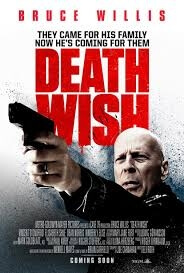Armed not just with an unregistered pistol but also his trusty squint and smirk, Willis projects a little more personalty than what Bronson’s waxy tough-guy routine ever allowed. But he’s sleepwalking down mean streets he’s walked before, in his fair share of DTV action junk (descended from the original Death Wish and its execrable offspring), as well as in Unbreakable, a much more elegant thriller about a hooded vigilante who finds meaning in crimefighting. You almost have to admire Death Wish for not even pretending to care about the psychological toll of killing; here, blowing away scumbags is a cleansing, even centering experience for Paul, who circumvents the twin, explicitly linked processes of grief and justice by getting handy with a handgun. It’s an icky kind of macho self-actualization, spurred by his father-in-law’s insistence that “You have to protect your own.” As right-wing violence porn, Death Wish is surprisingly, maybe inadvertently adept at capturing the contradictions of the right; it both insists that police alone can’t protect you and absolves the cops of any responsibility to solve gang murders, as the detective on the case (Dean Norris) shifts the blame on a community that won’t give up its own.
One can’t help but wonder what Joe Carnahan, who disowned the project but still got full screenwriting credit, might have done with the material. Would his allegedly more subversive version come closer to capturing the ambivalence of Brian Garfield’s novel, or at least recall Carnahan’s own soulful interrogation of masculinity, The Grey? This Death Wish feigns a dialogue, which is to say that it covers its ass. When Paul’s extreme neighborhood watch program makes him a social-media sensation, a Greek chorus of radio hosts debate his shooting spree, pitting the cheerleading of Windy City shock jock Mancow against the devil’s-advocate skepticism of MTV alum Sway. (When Paul guns down an infamous Chicago drug lord in broad daylight, it’s the latter who openly asks whether we should be celebrating a white guy in a hoodie killing black citizens—and the film, to its credit, does put far fewer people of color in the crosshairs than the original did.) At times, Death Wish almost looks like satire with the satire removed; a trip to a gun store, where Paul gets a tutorial in firearm ownership from a chipper clerk, is bright and comic in tone, but mostly just comes across like a commercial, one selling how easy (but not too easy) it is to get your hands on a gun.
Horror’s premier isolationist, Eli Roth has always communicated an essentially conservative worldview though his grindhouse throwbacks and splat-pack provocations. (He’d make a good fit for the Death Wish-indebted Taken series, whose solemn warnings about getting on a plane and leaving the safety of suburban America align pretty neatly with his own grislier, genre-adjacent cautionary tales.) But Death Wish finds the director digging deeper into the anti-P.C. niche he dug for himself with the cannibal throwback The Green Inferno, which punished college kids for the sin of caring about stuff, and Knock Knock, a sick-joke erotic thriller that spun on sexual entrapment by lying coeds. He’s the genre maverick as bomb-throwing Reddit troll, pissing off the libs one sneering, self-plagiaristic shocker at a time. Death Wish could be a sincere battle-cry for Second Amendment types, or it could just be another badge of “edginess” for Roth to wear on his sleeve. Either way, he only seems to locate his bad-taste Hostel mojo during a graphically violent, sadistic torture scene.
By most metrics, this Death Wish is a better movie than the first one. The acting is stronger, and it’s much more confidently, dynamically directed, Roth sweeping his camera alongside speeding cars and across the towering towers of the Windy City as though he were auditioning to make a Batman movie. There are moments when it almost works as a dopey, brutal B-movie, in the tradition of a thousand action distractions about fed-up everymen steeling their nerves and leaping into danger—a species of low-brow entertainment the original helped popularize. But whether uncritically brought over in remake translation or genuinely reaffirmed, the movie’s fucked-up politics poison the fun. By the end, which creates an unmistakably symmetrical arc for Paul, Death Wish has all but devolved into a scare-tactics advertisement for locked-and-loaded home protection. Which is to say, this is very much a movie that believes that more guns, not less, will make us all safe. With any luck, that’s a philosophy that will soon look as outdated as Bronson’s facial hair.

 Keep scrolling for more great stories.
Keep scrolling for more great stories.
